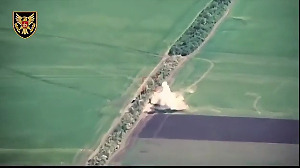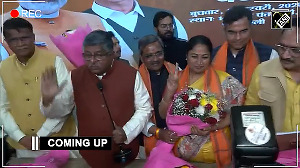The university has longstanding ties with American institutions and is one of the key establishments involved in the United States-India Knowledge Initiative on Agriculture.
The Knowledge Initiative, finalised during Prime Minister Dr Manmohan Singh's visit to the US in July 2005, focuses on promoting teaching, research, service and commercial linkages between India and the US.
Established on June 12, 1964 and formally inaugurated on March 20, 1965 by then prime minister Lal Bahadur Shastri, the Acharya N G Ranga Agricultural University is one of the country's oldest state agricultural universities. Its building programme was launched by then prime minister Indira Gandhi on June 23, 1966.
The public-funded state university was set up according to the recommendations of the Sarvepalli Radhakrishnan Commission on University Education (1949) and the First (1955) and Second (1960) Joint Indo-American Teams appointed by the Government of India to study the status and future of agricultural education in the country.
Originally known as the Andhra Pradesh Agricultural University, it was re-christened on November 7, 1996, in honour and memory of outstanding parliamentarian, educationist, farmer leader and freedom fighter Professor N G Ranga.
The university was established on the pattern of the American Land Grant Colleges -- cooperation between which and Indian agricultural research institutions helped usher in the Green Revolution in India in the 1960s.
The university -- which aims to arm the Indian farmer with technology and know-how to be a global player -- has 13 college campuses, 66 research stations, 22 district agro-advisor and transfer of technology centres, seven polytechnics and 12 Krishi Vigyan Kendras.
The 5,000-hectare campus at Rajendranagar houses nearly a dozen national institutes, including the Directorates of Rice and Oilseeds Research, the National Academy of Agricultural Research Management, the National Institute of Agricultural Extension Management, the National Plant Protection Training Institute, the National Institute of Rural Development and the National Research Centre for Sorghum.
The university with a present total staff strength of 5,800 offers under-graduate and masters degree programmes in 39 disciplines, doctoral degree programmes in 22 disciplines, and post-matriculation diploma programmes in four disciplines.
The university, which provides technology backup for 13 departments of the state government, has released 302 varieties of different crops.
Some of the rice varieties it has developed are popular in 14 other states in India and four countries.
Three of the rice varieties it has developed occupy 10 million hectares out of the 40 million hectares of rice-cultivated area in India.
The Swarna (which is responsive to low nitrogen levels) and Samba Masuri (a super fine variety) rice varieties developed by the university occupy about 12 per cent and 3 per cent of the rice-cultivated areas in the country.
Besides helping the government departments on various aspects of agriculture, livestock production, fisheries, horticulture and allied areas related to farming and rural development, the university provides basic support for activities such as radio and interactive television broadcasts for farmers.
In July 2003, a Farmers' Call Centre was established with 16 scientists deputed from the university to provide over-the-telephone solutions to farmers' queries.
The university is among the four institutes selected for assistance under the World Bank-assisted Agricultural Human Resource Development Project.






 © 2025
© 2025